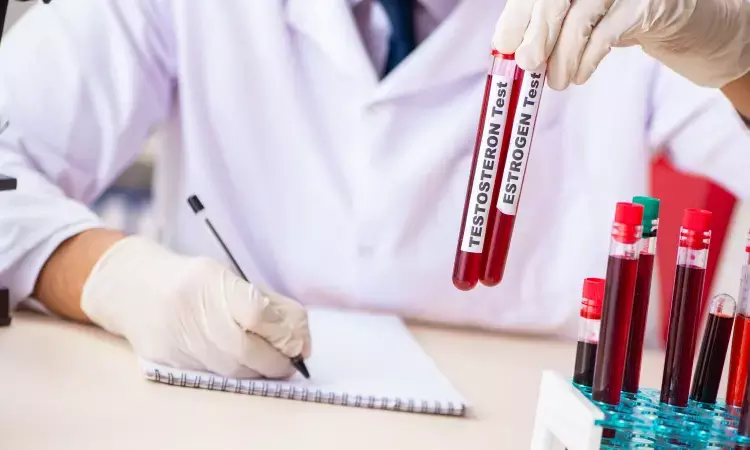- Home
- Medical news & Guidelines
- Anesthesiology
- Cardiology and CTVS
- Critical Care
- Dentistry
- Dermatology
- Diabetes and Endocrinology
- ENT
- Gastroenterology
- Medicine
- Nephrology
- Neurology
- Obstretics-Gynaecology
- Oncology
- Ophthalmology
- Orthopaedics
- Pediatrics-Neonatology
- Psychiatry
- Pulmonology
- Radiology
- Surgery
- Urology
- Laboratory Medicine
- Diet
- Nursing
- Paramedical
- Physiotherapy
- Health news
- Fact Check
- Bone Health Fact Check
- Brain Health Fact Check
- Cancer Related Fact Check
- Child Care Fact Check
- Dental and oral health fact check
- Diabetes and metabolic health fact check
- Diet and Nutrition Fact Check
- Eye and ENT Care Fact Check
- Fitness fact check
- Gut health fact check
- Heart health fact check
- Kidney health fact check
- Medical education fact check
- Men's health fact check
- Respiratory fact check
- Skin and hair care fact check
- Vaccine and Immunization fact check
- Women's health fact check
- AYUSH
- State News
- Andaman and Nicobar Islands
- Andhra Pradesh
- Arunachal Pradesh
- Assam
- Bihar
- Chandigarh
- Chattisgarh
- Dadra and Nagar Haveli
- Daman and Diu
- Delhi
- Goa
- Gujarat
- Haryana
- Himachal Pradesh
- Jammu & Kashmir
- Jharkhand
- Karnataka
- Kerala
- Ladakh
- Lakshadweep
- Madhya Pradesh
- Maharashtra
- Manipur
- Meghalaya
- Mizoram
- Nagaland
- Odisha
- Puducherry
- Punjab
- Rajasthan
- Sikkim
- Tamil Nadu
- Telangana
- Tripura
- Uttar Pradesh
- Uttrakhand
- West Bengal
- Medical Education
- Industry
Testosterone replacement therapy may not increase risk of prostate cancer among men with hypogonadism

The impact of testosterone replacement therapy (TRT) on prostate cancer and other adverse prostate events remains unclear. Does TRT in men with hypogonadism elevate the risk of high-grade or any prostate cancer or other adverse prostate events? This needs to be further investigated.
Men with hypogonadism and no high risk for prostate cancer who received TRT showed low and similar incidences of high-grade or any prostate cancer, acute urinary retention, and invasive surgical procedures for BPH compared to a placebo. TRT did not worsen lower urinary tract symptoms, according to a recent study published in JAMA Network Open.
The study conducted in 316 clinical trials in the US aimed to compare the effect of TRT versus placebo. The primary outcome measured was the incidence of adjudicated high-grade prostate cancer, and secondary endpoints included the incidence of any adjudicated prostate cancer, acute urinary retention, invasive prostate surgical procedure, prostate biopsy, and new pharmacologic treatment. The intervention effect was analyzed using a discrete-time proportional hazards model.
Key points from the study are:
- The study included 5198 men of mean age 63 years with hypogonadism with increased risk or preexisting cardiovascular disease.
- 2596 men received TRT.
- 1.62 % testosterone transdermal gel was applied daily during the study period.
- 2602 patients in the placebo group were given matching placebo gel to be applied daily.
- At baseline, the mean PSA concentration and IPSS were 0.92 ng/mL and 7.1, respectively.
- The mean treatment duration in the TRT group and placebo was 21.8 months and 21.6 months, respectively.
- During 14 304 person-years of follow-up, the incidence of high-grade prostate cancer did not differ significantly between groups. (0.19 % for TRT and o.12 % for placebo with a hazard ratio of 1.62)
- There was a greater increase in PSA concentrations in testosterone-treated men.
The study's findings will help clinicians and patients make informed decisions about the potential risks of TRT, they said.
Reference:
Bhasin S et al. Prostate Safety Events During Testosterone Replacement Therapy in Men With Hypogonadism: A Randomized Clinical Trial. JAMA Netw Open. 2023;6(12):e2348692. doi:10.1001/jamanetworkopen.2023.48692
BDS, MDS in Periodontics and Implantology
Dr. Aditi Yadav is a BDS, MDS in Periodontics and Implantology. She has a clinical experience of 5 years as a laser dental surgeon. She also has a Diploma in clinical research and pharmacovigilance and is a Certified data scientist. She is currently working as a content developer in e-health services. Dr. Yadav has a keen interest in Medical Journalism and is actively involved in Medical Research writing.
Dr Kamal Kant Kohli-MBBS, DTCD- a chest specialist with more than 30 years of practice and a flair for writing clinical articles, Dr Kamal Kant Kohli joined Medical Dialogues as a Chief Editor of Medical News. Besides writing articles, as an editor, he proofreads and verifies all the medical content published on Medical Dialogues including those coming from journals, studies,medical conferences,guidelines etc. Email: drkohli@medicaldialogues.in. Contact no. 011-43720751


